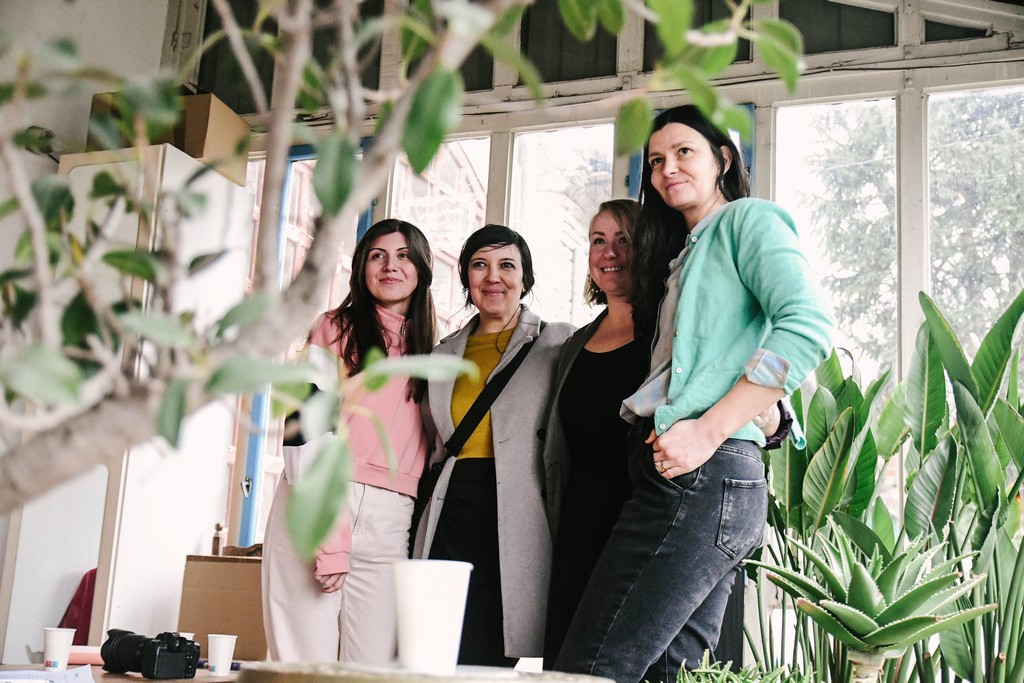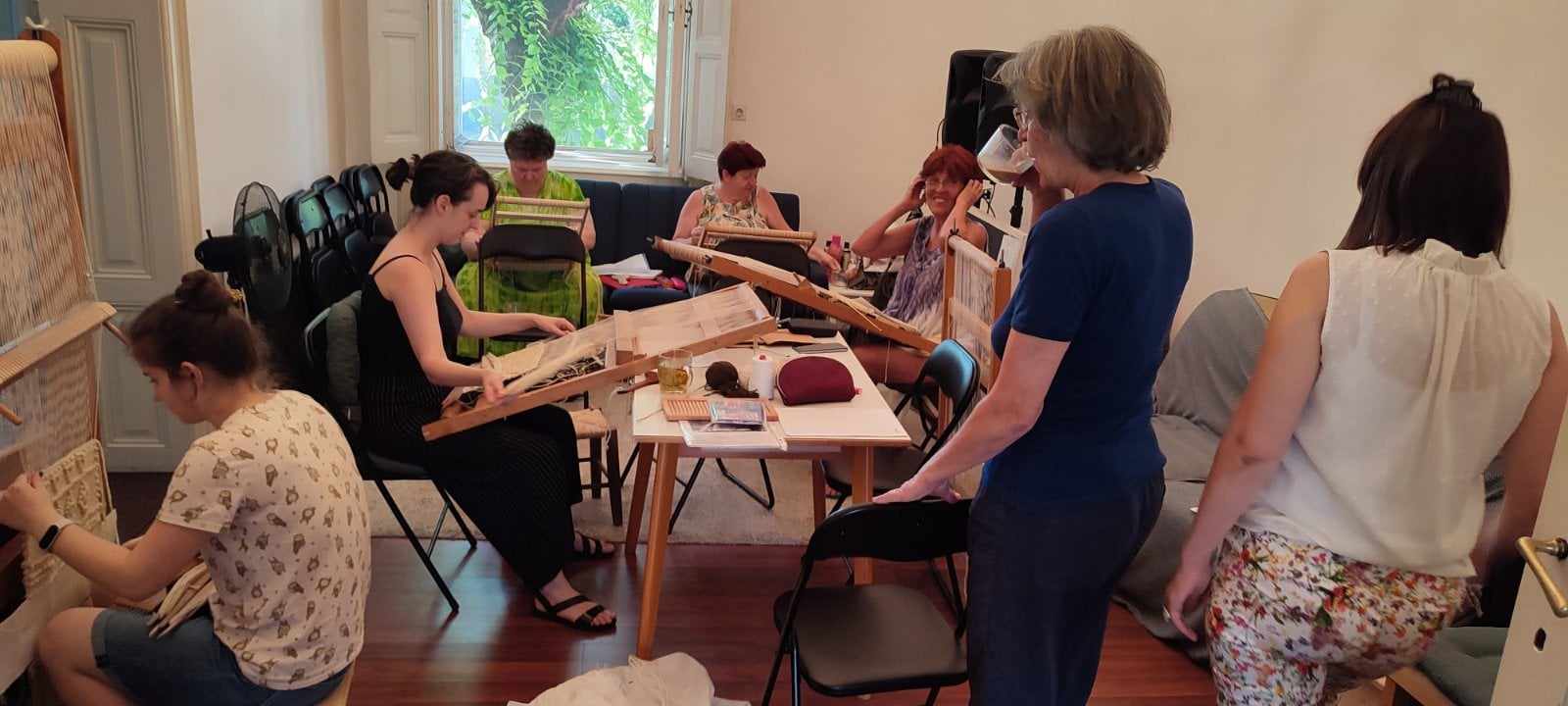
“We always take pride in being a multinational city, but we realized that we had no space to unite and gather across ethnic lines. Culture in Subotica is often a tool for local authorities to foster divisions among different national groups,” says Gordana Vukov Ciganjik, co-founder of the cultural association Klara i Rosa in Vojvodina, Serbia.
“For example, if the local authorities decide to build three monuments, the Croats will get the smallest one, outside the city centre; the Hungarians will get a bigger one, closer to the centre; and the biggest, most central monuments will be for Serbs. We are not completely separated, there are many mixed marriages; but you’re always forced to define yourself as a nation, not a person,” she explains.
With Klara i Rosa, Gordana – who is an actress by profession – and fellow founder Danijela Mamužić – a sculptor – wanted to offer a place for cultural exchange, dialogue and citizens’ engagement through art beyond ethnic origin.
“We believe that art is a key tool for social change,” says Gordana. “In this day and age – particularly after the pandemic – people are more and more alienated, lonely, and society is more closed off to newcomers. For us, the role of arts and culture is to heal and connect, to build community, to start a dialogue on topics that would be taboo otherwise.”
For the first nine years of its existence, Klara i Rosa had to use public spaces – parks, squares, streets – for its activities. They transformed the yard of an abandoned old cinema into the first open gallery in Subotica, with arts exhibitions every month. EED funding has changed this, enabling the group to rent a space for their activities for the first time.
These events range from movie screenings and concerts to ceramic courses and theater workshops, all in the spirit of cultural exchange and community-building through art.
They have also opened Plac, a radio station that allows everyone to be a creator. In their space, a local high school philosophy teacher hosts public discussions on all kinds of topics, from politics to love and death. Their activities are held in Serbian-Bosniak-Croatian (BHS) BHS and Hungarian, but more and more often also in English, to include foreigners who have just moved to Subotica and to give citizens an opportunity to practice the language.
Gordana describes an annual retreat for female artists and activists as one of the organization’s biggest successes to date: “Some participants said it changed their life. They came from all over the Balkans, and had a unique opportunity to meet, make new connections, start new projects.”
Another successful initiative was a Romeo-and-Juliet-inspired interactive theater workshop with high school students from Subotica, half of them BHS-speaking and half of them Hungarian-speaking. “These teenagers are going to the same school, but are usually divided along language lines,” says Gordana, “This project was a unique space for them to meet. Without opportunities to interact with peers from different language communities, political polarization grows.”
Sometimes ideas for new events are born by chance: a conversation on food with a volunteer from Russia sparked the idea of a cooking class. Other times, people come to the Klara i Rosa office with ideas. “It’s important for us to keep our door open to new initiatives,” says Gordana, “This helps us develop an audience and keeps our program varied and interesting. It’s also empowering for the community, so they can feel ownership of our cultural space.”
Community support also came through with a fundraising campaign that allowed Klara i Rosa to raise the equivalent of €3,800 for future activities. “It might not seem like much, but it showed that we are supported by a community with shared interests and goals,” says Gordana.

As Gordana sees it, EED’s support has empowered them to have ambitious goals for the future. They have begun a dialogue with local authorities, and are further developing their youth audience, particularly among Hungarian speakers. They also plan to increase collaborations and capacity-building activities with like-minded actors to serve their community in the best way they can.
“We have big plans and dreams, and I think that thanks to our team we’ll succeed. Our biggest treasure is people,” says Gordana. “We want to continue to connect people through art and to bring people together from other places. We want to share our culture, and we want to help people understand that they don’t need to leave Subotica for a better life, that they can be happy here.”
This article reflects the views of the grantees featured and does not necessarily represent the official opinion of the EED and WeBalkans.
For the first nine years of its existence, Klara i Rosa had to use public spaces – parks, squares, streets – for its activities. They transformed the yard of an abandoned old cinema into the first open gallery in Subotica, with arts exhibitions every month. EED funding has changed this, enabling the group to rent a space for their activities for the first time.
These events range from movie screenings and concerts to ceramic courses and theater workshops, all in the spirit of cultural exchange and community-building through art.
They have also opened Plac, a radio station that allows everyone to be a creator. In their space, a local high school philosophy teacher hosts public discussions on all kinds of topics, from politics to love and death. Their activities are held in Serbian-Bosniak-Croatian (BHS) BHS and Hungarian, but more and more often also in English, to include foreigners who have just moved to Subotica and to give citizens an opportunity to practice the language.
Gordana describes an annual retreat for female artists and activists as one of the organization’s biggest successes to date: “Some participants said it changed their life. They came from all over the Balkans, and had a unique opportunity to meet, make new connections, start new projects.”
Another successful initiative was a Romeo-and-Juliet-inspired interactive theater workshop with high school students from Subotica, half of them BHS-speaking and half of them Hungarian-speaking. “These teenagers are going to the same school, but are usually divided along language lines,” says Gordana, “This project was a unique space for them to meet. Without opportunities to interact with peers from different language communities, political polarization grows.”
Sometimes ideas for new events are born by chance: a conversation on food with a volunteer from Russia sparked the idea of a cooking class. Other times, people come to the Klara i Rosa office with ideas. “It’s important for us to keep our door open to new initiatives,” says Gordana, “This helps us develop an audience and keeps our program varied and interesting. It’s also empowering for the community, so they can feel ownership of our cultural space.”
Community support also came through with a fundraising campaign that allowed Klara i Rosa to raise the equivalent of €3,800 for future activities. “It might not seem like much, but it showed that we are supported by a community with shared interests and goals,” says Gordana.

As Gordana sees it, EED’s support has empowered them to have ambitious goals for the future. They have begun a dialogue with local authorities, and are further developing their youth audience, particularly among Hungarian speakers. They also plan to increase collaborations and capacity-building activities with like-minded actors to serve their community in the best way they can.
“We have big plans and dreams, and I think that thanks to our team we’ll succeed. Our biggest treasure is people,” says Gordana. “We want to continue to connect people through art and to bring people together from other places. We want to share our culture, and we want to help people understand that they don’t need to leave Subotica for a better life, that they can be happy here.”
This article reflects the views of the grantees featured and does not necessarily represent the official opinion of the EED and WeBalkans.
Please wait while your video is being uploaded...
Don't close this window!